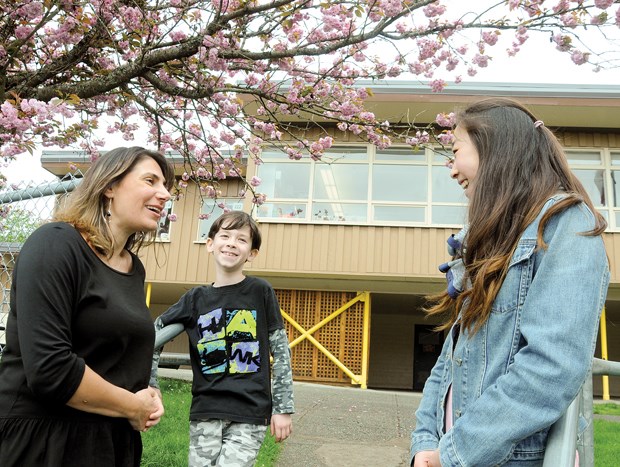Irwin Park elementary school isn’t home to any fancy specialty education programs – it’s not a French Immersion or an International Baccalaureate school.
It’s a big school, with about 400 students, and an increasingly diverse one – about 26 per cent of kids who attend don’t speak English as a first language and about six per cent have special needs.
As Irwin Park principal Liz Hill puts it, “We are a regular school.”
But this regular West Vancouver public school earned special recognition this week when it was ranked among the top elementary schools in the province in the annual Fraser Institute’s school ranking report card.
Another West Vancouver public school – Ecole Cedardale – received the same top score of 10 out of 10 on the institute’s rankings. The two public schools shared the top spot with 16 private schools, including West Vancouver’s Mulgrave school.
Hill credits dedicated teachers, supportive parents and a welcoming attitude for success in the classroom.
The school has a focus on teaching kids self-regulation skills early so they’re ready to learn, she said, and encourages reading with a special primary reading program.
“When you walk into a school you get a sense and feeling of what a school is all about. People say hi to you when you walk in.”
Overall, West Vancouver public elementary schools were ranked by the Fraser Institute as the best in the province, with an average score of 9.2 out of 10.
Chris Kennedy, schools superintendent for West Vancouver, acknowledges some of that academic success likely has to do with the relative affluence and education of West Vancouver parents.
The school district’s small size is also an advantage, he said.
“We’re able to pinpoint students who are struggling,” he said, and offer support early on, while in a larger system, those kids can sometimes fall through the cracks. “We’re not overwhelmed by sheer numbers.”
The Fraser Institute’s school rankings remain controversial decades after the right-wing think tank began scoring schools based on results on standardized academic foundation skills assessment (FSA) tests administered by the Ministry of Education.
The B.C. Teachers Federation has long campaigned to scrap those tests, saying they are not a good indicator of learning, fail to account for large socio-economic differences between schools and are used by the Fraser Institute to promote private schools at the expense of public education.
“We don’t put any credence in the ranking,” said Rob Millard, president of the West Vancouver Teachers Association.
Test scores are only “a snapshot of what’s going on for that student on any particular day,” he said.
“We don’t have too many kids in our district who are going to school hungry.”
Kennedy said as a parent whose own kids wrote the FSA tests, “it’s another piece of useful information,” along with the assessment of the classroom teacher.
As an administrator, Kennedy said the test scores can be useful in flagging concerns in cases where kids aren’t meeting provincial expectations.
One criticism he has of the tests is “they do feel dated” in their focus on reading, writing and math. “In terms of what we’re valuing, how creative or innovative kids are is also important,” he said.
Kennedy said his advice to parents wanting to know how schools are doing is “go and visit the school” – starting with the one in the neighbourhood. He added more parents probably get their information about schools from chatting on the soccer sidelines than they do from the Fraser Institute.



